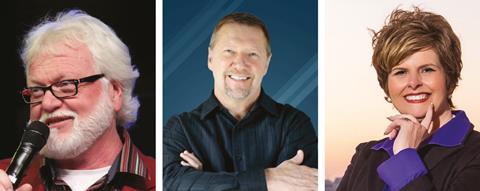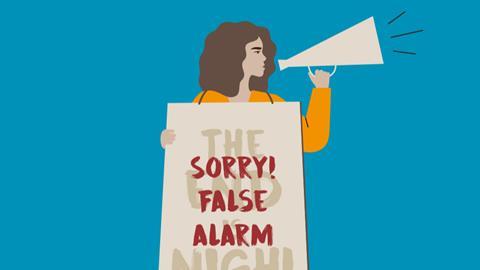Respected leaders in the American Church were convinced God had told them Donald Trump would be re-elected president. Dave Roberts analyses why so many got it wrong, and seeks trusted voices to help us understand the role of the prophetic today
In the run-up to the November 2020 presidential election, significant sections of the American Church not only urged Christians to vote again for Donald Trump, but prophesied he would win. As David Stark, the co-founder of the Global Prophetic Alliance, observes, these predictions did not come from “fruitcakes and conspiracy theorists”, but from “seasoned and respected prophetic leaders”.
While there were many voices prophesying that Trump would win a second term, two of the most familiar to British ears were Chuck Pierce, whose words were championed by the publisher of Charisma magazine Stephen Strang, and Kris Vallotton of Bethel Church Redding.
Pierce had correctly prophesied that Obama and Trump would be elected presidents, with the Trump prediction made as long ago as 2008. In the run-up to November last year, Strang quoted Pierce liberally in books such as God, Trump, and the 2020 Election: Why He Must Win and What’s at Stake for Christians If He Loses (Charisma House). He cited Pierce’s prophetic track record and, like many others, took up the ‘Cyrus defence’, writing: “God answered our prayers in a way we didn’t expect with a person we didn’t necessarily like. But once Trump began to implement his policies, we were sure we had made the right choice.”
MANY A MODERN PROPHETIC PERSON COULD BE SAVED INCALCULABLE EMBARRASSMENT HAD THEY BEEN MORE MODEST IN THEIR CLAIMS
Pierce is part of a wider prayer movement that includes the likes of Dutch Sheets and Cindy Jacobs. Their emphasis on territorial spirits, popularised in Frank Perreti’s popular 1986 novel This Present Darkness (Crossway) has drawn them towards analysis of social and political subcurrents and the role of the Church in rebuking the work of Satan. But Jacobs’ spirited and deeply reflective defence of women in ministry and Dutch Sheets’ wise words of warning about mistakes surrounding the handling of the controversial healing evangelist Todd Bentley, will have suggested to many that these leaders were not drawn from the ranks of the perpetually excited, and would not speak lightly. Yet even after Joe Biden had won the vote, Sheets was doubling down, declaring: “This [result] is going to be overturned and President Trump is going to be put back in office for four years.” Jacobs struck a more repentant tone, tweeting in January: “Was my heart centred on Jesus or politics?…Confession! My heart was centred on politics. So sorry, Lord!”

DOMINION
Many of those who seek to understand what God might be doing or desiring globally have what might be described as an apocalyptic worldview. This focuses on discerning God’s hidden will for nations and the timetable of the end times. Some would view this as the lingering ghost of a Constantinian mindset. The Roman emperor who made Christianity a state religion ignited a 1,600-year tension between those desiring a “Christian nation” and those who felt that the kingdom of God should be taken hold of by Holy Spirit-prompted searching and not imposed by popes, prelates or presbyteries.
Stark questions whether we should be quite so concerned about the nation state but should instead actually focus on the will of God made manifest in the Church: “We must love the kingdom of God more than our own nation. Remember that Jesus is our saviour; a president or prime minister is not. Political ideologies cannot and have never saved anyone. Understand that on occasions God gives us leaders that we don’t like, don’t want or who are outside of our preference, in order to provoke the Church to be a beacon of light. Jesus is coming back for a spotless bride, rather than a spotless nation. He provokes his Church to come up higher in purity and passion and it’s a fact that the Church often grows more in persecution than when she gets her own way under the leaders who she likes.”
Many in the charismatic world have also drunk deeply at the ‘seven mountains’ well. This idea has been popularised in many corners of the Church and teaches that Christians are called to influence: education, popular culture, sport and recreation, family, religion, business and media. Much of this emphasis can be positive, but some have promoted a mindset of dominion and domination. This partly explains why American believers are so galvanised about socio-political issues in a way that they were not 40 years ago. Doorkeepers such as James Dobson (Focus on the Family), Paula White (Independent Charismatic), George Bush (who was coherent to evangelicals because he was one), Tim La Haye (who wrote the Left Behind series) and broadcaster Pat Robertson (CBN) helped inch Christians towards a more active stance in the civic sphere. This has leaked into the prophetic discourse.
At the heart of US evangelicals’ opposition to the Democratic agenda are very real issues around the state of Israel, abortion, religious freedom, judicial overreach and same-sex marriage. There is also a deep rooted suspicion of ‘socialism’ in the evangelical mindset in the USA which leaves little room for distinctions around social democracy and social contracts. This dominating idea colours the mindset of many believers. It is rare for these same evangelicals to campaign on other, equally important, pro-life issues, including the plight of refugees, the absence of affordable healthcare for millions, poverty and creation care. There are many reasons why the second set of issues are not often championed by evangelical charismatics, but it does seem to many here in the UK that these bands of ‘one-eyed’ prophets are missing large parts of God’s story in their analysis.
HANDLING FAILURE
In the day-to-day reality of church life, how do we handle both local and national prophetic failure? Bearing in mind that even seasoned prophets get it wrong sometimes, the challenge for many of us revolves around how we “do not treat prophecies with contempt” but also “test the spirits” (1 Thessalonians 5:20; 1 John 4:1-6).
Some, such as Kris Vallotton, have chosen humility. In a video on the Bethel Church website he said: “I was completely wrong. I take full responsibility for being wrong. There was no excuse for it. I think it doesn’t make me a false prophet, but it does actually create a credibility gap. A lot of people trust me; trust my ministry. I want to say I am very sorry to everyone who put their trust in me. There was this major, major mistake.
“I want to say I’m sorry and I want to look into the reasons why there was a disconnection there in what I heard. I have always believed that when you make a public declaration; that if you get it wrong, you have to make a public apology.”
WE MUST LOVE THE KINGDOM OF GOD MORE THAN OUR OWN NATION
Writing on the Premier Christianity blog, RT Kendall also urged humility. Pointing to the third commandment, “Do not misuse the name of the Lord your God” (Exodus 20:7), he argued we must never claim to speak for God in order to make ourselves look good. As Jesus said, we should simply say “yes” or “no” (Matthew 5:33-37) and not add the Lord’s name to enhance our credibility: “Saying ‘the Lord told me’ is a habit some of us find hard to break. But I believe we need to,” Kendall wrote. “If one will keep the name of the Lord out – but simply say ‘I feel I must say this to you’, they might maintain their integrity, credibility and anointing – even if they get it wrong. Many a modern prophetic person could be saved incalculable embarrassment had they been more modest in their claims.”
Debra Green is the founder of the UK-based Christian social action charity Redeeming Our Communities (ROC). She has valued the prophetic as ROC has sought both direction and practical resources, such as the building they secured. She is honest about our fallibility and the possibility that we might prophetically fail at times. “When someone is ill or discouraged you can get too enthusiastic. Out of compassion you want to bring them hope – but it can be you, not what God has prompted in you.” She also thinks that people can experience something of the prophetic but then mistake their own thoughts for God’s because they are not versed enough in scripture to check their own words before declaring them.

Roy Godwin was the leader of Ffald-y-Brenin community in Wales for 20 years. His initial call there was cemented by a conversation with their trustees. He had gently turned down the job and was surprised to hear from them some weeks later to share the phrase “the door is open”. He had been praying for some time on the day that they rang and had felt God speak this phrase to him repeatedly. He was shocked to have this short line repeated to him over the phone in the minutes after he had heard God speak. His recounting of the story in The Grace Outpouring is part of a catalogue of the prophetic and the supernatural, which has provoked prayer movements in multiple nations. He is calmly down to earth about our prophetic lapses: “In our humanity we can share what God prompted in us and then add our own thoughts. That’s why we need to weigh prophecies. If we think we will always get it right we’re setting ourselves up for a fall.”
Godwin also has several criteria when it comes to weighing prophecy or testing the spirits. “I ask myself what I am feeling about what I just heard. Did my spirit rise? What do I know of the person’s life and track record? All of this tempered with the realisation that unlikely people can speak deep truths. Does what they say match scripture? Are they well known as having an agenda?”
Green also notes the importance of character in the prophet. “Are they accountable, teachable and humble and known as people of prayer?” She notes that sometimes people with prophetic gifting should be among those weighing prophecy and also emphasises the importance of “peace or a lack of peace. The Holy Spirit will be with us to aid discernment.”
Fallible prophets are a reality. False prophets, a rarity. Wannabee prophets can be a pain. But humble prophets can be the breath of God for our tired and weary world. Despise not prophesying.

What the Bible says about false prophets
Prophetic utterance today happen when people receive impressions through biblical study, dreams, visions, word pictures, visual images, verbal flows of declaration and what some describe as a ‘louder voice’ in their head. This may take two forms: forthtelling, which is the application of biblical truth to contemporary situations, or insights into future events. Both can be tainted by our humanity so scripture urges us to weigh and test prophetic utterance. The same God who gives gifts of prophecy also gives gifts of discernment to help the Church embrace truth and avoid error.
• Jesus told us that there would be wolves in sheep’s clothing who would prey on people, prophesy in his name and be so persuasive that they would lead astray true believers (Matthew 7:15; 7:22; 24:11).
• Paul reminds us that some would come disguised as apostles of Christ and would deceive the hearts of the naive. He warns Timothy that as a result, the people “will turn their ears away from the truth and turn aside to myths” (2 Timothy 4:3-4).
• In 1 Timothy, Paul writes that deceivers have “an unhealthy interest in controversies and quarrels about words that result in envy, strife, malicious talk, evil suspicions and constant friction between people of corrupt mind, who have been robbed of the truth” (1 Timothy 6:4-5).
False prophets who lead people into idolatry and the worship of other gods are relatively rare today. But prophetic failure among the usually accurate should not surprise us and should encourage us to test what we hear.
Commenting on the humanity of some of the biblical prophets, David Stark notes: “Scripture describes prophets who ran away (Jonah), prophets who got depressed (Elijah), prophets who misused their authority to cause unjustifiable destruction (Elisha – with tragic consequences in 2 Kings 2) and even 400 so-called prophets who were quite happy to prophesy whatever the king wanted to hear, even if it was utter nonsense (1 Kings 22). When the Corinthian prophets are instructed to weigh carefully what they each prophesy (1 Corinthians 14:29) it suggests that not everyone in the room was hitting the bullseye.”





























